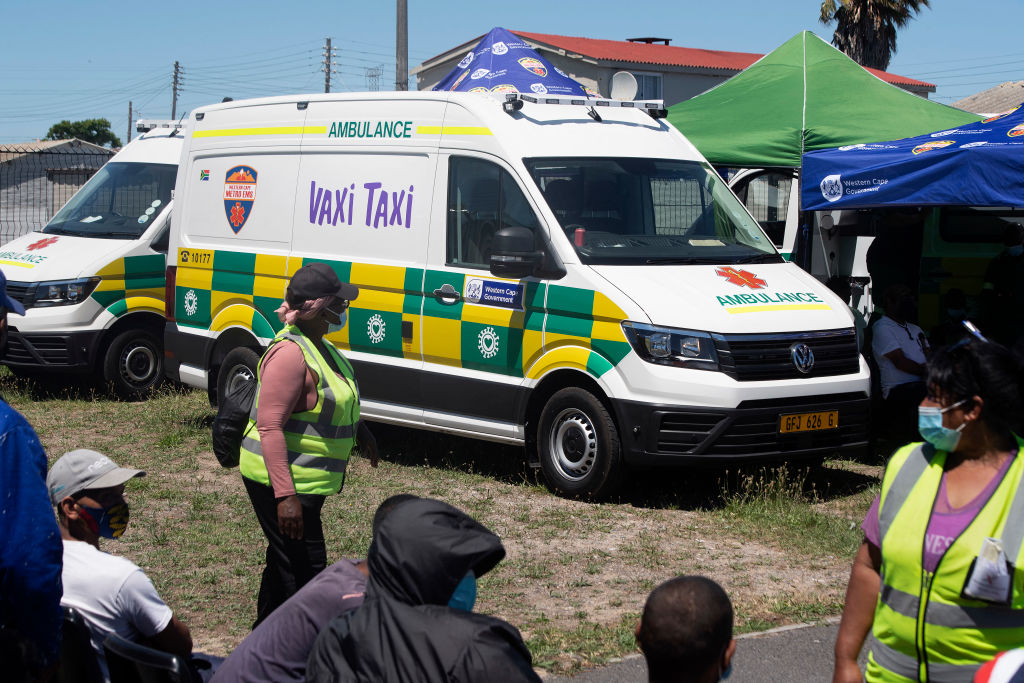South African study adds more evidence Omicron is less severe, only partly vaccine-resistant


COVID-19's Omicron variant continues to spread around the U.S. and the world, and the World Health Organization on Monday deemed it a "very high" global risk. But a study released Tuesday by Discovery Health, South Africa's largest health insurer, offered more evidence that the new coronavirus strain causes milder illness, even as it evades some of the protections from the Pfizer-BioNTech vaccine.
The study examined 211,000 positive COVID-19 cases, including 78,000 South Africans who contracted the Omicron variant. It found that hospital admissions are 29 percent lower among adults infected with the Omicron than in the first wave of the pandemic back in mid-2000, and those hospitalized had less serious symptoms. .
Two doses of the Pfizer vaccine, the main vaccine in South Africa, provided just 33 percent protection against infection, much lower than against previous variants, but also provided 70 percent protection against severe symptoms that lead patients to be hospitalized, down from 90 percent against Delta, The Washington Post reports. That is still "very good protection," the researchers said. Pfizer says a third booster dose raises protection back to Delta levels.
The Week
Escape your echo chamber. Get the facts behind the news, plus analysis from multiple perspectives.

Sign up for The Week's Free Newsletters
From our morning news briefing to a weekly Good News Newsletter, get the best of The Week delivered directly to your inbox.
From our morning news briefing to a weekly Good News Newsletter, get the best of The Week delivered directly to your inbox.
A free daily email with the biggest news stories of the day – and the best features from TheWeek.com
Peter has worked as a news and culture writer and editor at The Week since the site's launch in 2008. He covers politics, world affairs, religion and cultural currents. His journalism career began as a copy editor at a financial newswire and has included editorial positions at The New York Times Magazine, Facts on File, and Oregon State University.
-
 How drones have detected a deadly threat to Arctic whales
How drones have detected a deadly threat to Arctic whalesUnder the radar Monitoring the sea in the air
-
 A running list of the US government figures Donald Trump has pardoned
A running list of the US government figures Donald Trump has pardonedin depth Clearing the slate for his favorite elected officials
-
 Ski town strikers fight rising cost of living
Ski town strikers fight rising cost of livingThe Explainer Telluride is the latest ski resort experiencing an instructor strike
-
 Trump HHS slashes advised child vaccinations
Trump HHS slashes advised child vaccinationsSpeed Read In a widely condemned move, the CDC will now recommend that children get vaccinated against 11 communicable diseases, not 17
-
 A fentanyl vaccine may be on the horizon
A fentanyl vaccine may be on the horizonUnder the radar Taking a serious jab at the opioid epidemic
-
 Health: Will Kennedy dismantle U.S. immunization policy?
Health: Will Kennedy dismantle U.S. immunization policy?Feature ‘America’s vaccine playbook is being rewritten by people who don’t believe in them’
-
 How dangerous is the ‘K’ strain super-flu?
How dangerous is the ‘K’ strain super-flu?The Explainer Surge in cases of new variant H3N2 flu in UK and around the world
-
 Vaccine critic quietly named CDC’s No. 2 official
Vaccine critic quietly named CDC’s No. 2 officialSpeed Read Dr. Ralph Abraham joins another prominent vaccine critic, HHS Secretary Robert F. Kennedy Jr.
-
 This flu season could be worse than usual
This flu season could be worse than usualIn the spotlight A new subvariant is infecting several countries
-
 FDA OKs generic abortion pill, riling the right
FDA OKs generic abortion pill, riling the rightSpeed Read The drug in question is a generic version of mifepristone, used to carry out two-thirds of US abortions
-
 Why are autism rates increasing?
Why are autism rates increasing?The Explainer Medical experts condemn Trump administration’s claim that paracetamol during pregnancy is linked to rising rates of neurodevelopmental disorder in US and UK
